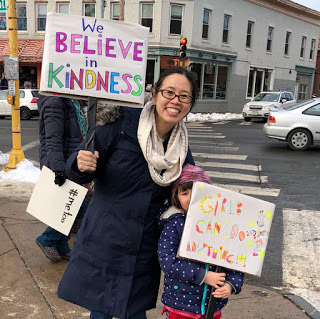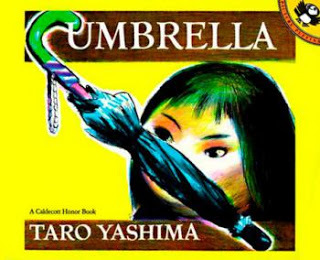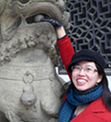date newest »
newest »
 newest »
newest »
 I very much respect you and your work. I struggle to understand this, though, and I'm going to ask some questions out of curiosity and a deep desire to understand (and I hope they don't come across as trying to challenge or argue, because that's not my intent). As you bring up The Snowy Day, a book about an African American child/family written by a white man: Is that different than what you're talking about? Because as a child, The Snowy Day was a favorite and I didn't know the writer was white, and I didn't care. I just loved the book. But based on what you seem to be saying, Keats shouldn't have written it--he should've let the idea go and waited for an African American author, or co-written it?
I very much respect you and your work. I struggle to understand this, though, and I'm going to ask some questions out of curiosity and a deep desire to understand (and I hope they don't come across as trying to challenge or argue, because that's not my intent). As you bring up The Snowy Day, a book about an African American child/family written by a white man: Is that different than what you're talking about? Because as a child, The Snowy Day was a favorite and I didn't know the writer was white, and I didn't care. I just loved the book. But based on what you seem to be saying, Keats shouldn't have written it--he should've let the idea go and waited for an African American author, or co-written it?Should I as a writer not include any non-white characters in my books, or just not as main characters, because I should leave that to people of that ethnicity? I'm genuinely confused by what you're saying here. Thanks for any further thoughts if they might illuminate this issue.
 Hi Reina, I am not saying Keats shouldn't have written the book. My essay is not about who writes what, but about truly and honestly evaluating if what we are creating is in line with our values and moral ideals. Only the person writing can decide that, but I think it’s an important thing to do.
Hi Reina, I am not saying Keats shouldn't have written the book. My essay is not about who writes what, but about truly and honestly evaluating if what we are creating is in line with our values and moral ideals. Only the person writing can decide that, but I think it’s an important thing to do.
 Grace wrote: "Hi Reina, I am not saying Keats shouldn't have written the book. My essay is not about who writes what, but about truly and honestly evaluating if what we are creating is in line with our values an..." Thanks for your reply. I ask myself such questions daily, about all aspects of my life, so I agree that it's important. Still, if I don't seek to understand and ask questions of others, I'll only be in my own viewpoint. Thanks again for the thought-provoking post.
Grace wrote: "Hi Reina, I am not saying Keats shouldn't have written the book. My essay is not about who writes what, but about truly and honestly evaluating if what we are creating is in line with our values an..." Thanks for your reply. I ask myself such questions daily, about all aspects of my life, so I agree that it's important. Still, if I don't seek to understand and ask questions of others, I'll only be in my own viewpoint. Thanks again for the thought-provoking post.
 I think too, if you write about a poc or someone other than your own experience, it should be done thoughtfully. If you are basing a character on someone you know personally, especially someone near and dear to you, someone you have had the time to observe and interact with and it is a fair representation, that's what the world needs, more voices, more perspectives, more examples to look to for, seeing yourself and relationships reflected in print. But I wouldn't want to see a projection or assimilation.
I think too, if you write about a poc or someone other than your own experience, it should be done thoughtfully. If you are basing a character on someone you know personally, especially someone near and dear to you, someone you have had the time to observe and interact with and it is a fair representation, that's what the world needs, more voices, more perspectives, more examples to look to for, seeing yourself and relationships reflected in print. But I wouldn't want to see a projection or assimilation.
 I think we run into serious problems as writers when we decide that the same sex, race, or nationality should be the only groups “allowed” to write about certain topics. If the goal is to have more diversity in books, then we all need to expand the diversity of our stories and our characters. Clearly this needs to be done in an empathetic way that avoids stereotypes and creates round characters, but that should be true even if we are writing characters that are similar to ourselves.
I think we run into serious problems as writers when we decide that the same sex, race, or nationality should be the only groups “allowed” to write about certain topics. If the goal is to have more diversity in books, then we all need to expand the diversity of our stories and our characters. Clearly this needs to be done in an empathetic way that avoids stereotypes and creates round characters, but that should be true even if we are writing characters that are similar to ourselves.In the specific case of the Women’s March, however, I completely agree with you. Since the entire point of the march was to have a forum for women to take leading roles while the men were welcome but expected to take only supporting roles, I agree that it feels contrary to the spirit of the march for a male writer to put out a book about the Women’s March devoid of any female input.
But this is a specific case and I don’t think it advisable to expand that argument to include you writing a book about Taro Yashima. I have little doubt that you would have done your research and written something engaging that would have served to elevate his profile. Censoring yourself due to your ethnicity strikes me as considerably more problematic.
Doris Kerns Goodwin has had an illustrious career writing about men (Lincoln, Johnson, the Kennedys, Roosevelt and Taft) and I think adding her voice to the long list of men writing on the same subjects has been a plus, not a minus. Maya Lin designed the Vietnam Memorial and she is a Chinese-American designer who hadn’t served in the military. This created a huge controversy at the time, but eventually the brilliance of her design spoke for itself. I’m sure there are hundreds of examples of this sort of thing along with legitimate counter-examples including the one you brought up about the Women’s March book.
I hope we can create a writing community where authors are neither compelled nor chastised into restricting their creativity. We’re seeing increased diversity in fiction and non-fiction, and I think this is a trend that benefits readers and authors. Thanks for writing such a thought-provoking post.








So please please, if you can, write about what you took away from the March with your daughter, put some version of this in as a note of why you needed to share. I personally don't care who was first, would be wary of buying the one you mentioned, and would be so proud for your voice to rise higher and louder! Also, that picture is adorable and I would love to see it in a book. Please, if you haven't already started, make this happen! I promise I will get my state library system to buy it (there are 50 branches) small, but a committment!
Thank you!